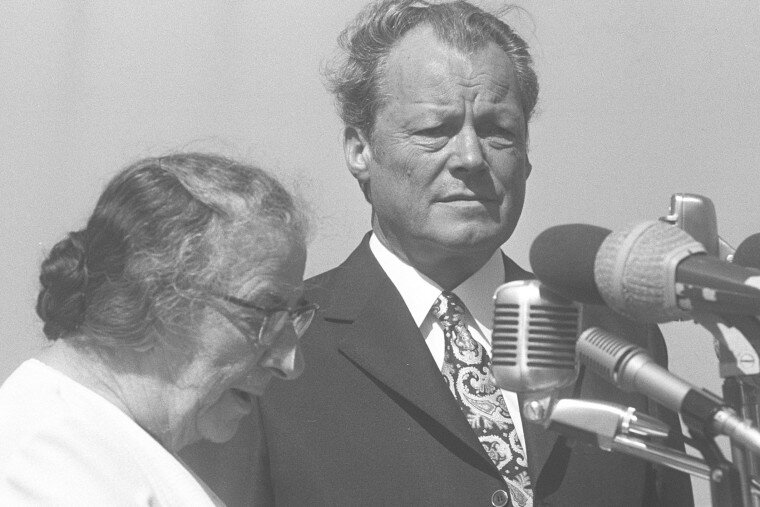Complex relationship between West Germany and Israel in the 1970s

West Germany and Israel went through a transformative relationship during the 1970s that was primarily related to the Holocaust legacy, security issues, and changing global destinies. Though West Germany and Israel established bilateral diplomatic relations in 1965, West Germany's relationship with Israel during the next decade was characterized by serious challenges and closely monitored political shifts.
Events of significance, such as the attack on Israeli athletes in Munich in 1972, the Yom Kippur War in 1973, and the rippling effects of the oil crisis, were critical turning points in bilateral relations.
A changing global and regional landscape
The 1970s were marked by global upheaval and fairly monumental shifts in geopolitical relations. The Cold War was present as a significant political factor, and the USA and USSR wrestled for unique positions of leverage in the Middle East.
The Yom Kippur War of 1973 (shorthand for the October War), as well as the oil crisis of 1974, provided lessons that had significant consequences for Israel, but also for Israel-Germany relations. While major shifts developed in foreign relations for Germany and Germany-Israel relations based on the active relations with the West, some roots for inter-German relations also developed.
Additionally, there were continuing events relating as well to the roots of left-wing insurgency begun in Germany in the late 1960s and also related to the continuing process of Vergangenheitsbewältigung.
For Israel, it was arguably a decade of successes and failures. In many ways, the Yom Kippur War revealed Israel's vulnerabilities and problems in its security strategy and plans. The peace process with Egypt, culminating, at least formally, with the Camp David Accords (1978), was promising for regional stability, but it also reflected the difficulty of Middle Eastern diplomacy.
It was against this overview of the Middle East that Germany and Israel sought to create a greater relationship, limited both by their historical and political realities and the global situation as well.
The Munich event (1972) and its impact on German-Israeli security cooperation
The 1972 Munich Olympics and their impact on German-Israeli security cooperation
One of the most defining events of the decade was the Munich attack during the 1972 Summer Olympics. The Palestinian armed group Black September took 11 Israeli sportsmen hostage, leading to a botched rescue operation by German security forces that resulted in the deaths of all hostages.
The incident had a profound impact on Germany’s relationship with Israel, highlighting weaknesses in German counterattack measures and prompting Israel to adopt a more aggressive approach to global threats.
In the aftermath, Israel launched "Operation Wrath of God," an intelligence-driven mission to eliminate those responsible for the attack. Meanwhile, West Germany reassessed its security policies, increasing intelligence cooperation with Israel.
This event also strengthened West Germany’s internal counterattack units, leading to the creation of the elite police unit GSG 9 in 1973.
The 1973 Yom Kippur War and Germany’s strategic dilemma
The outbreak of the Yom Kippur War in October 1973 presented West Germany with a diplomatic conundrum. As Israel faced a surprise attack by Egypt and Syria, it sought military aid from Western allies, including the United States and European countries.
However, the Arab oil-producing nations leveraged the conflict to pressure European states into adopting a more pro-Arab stance by threatening oil embargoes.
West Germany under Chancellor Willy Brandt was in a bind. Germany had a historical responsibility to Israel, but there were also important economic ties developing with the Arab world. Unlike the United States, which provided direct military supplies to Israel, West Germany chose not to provide any explicit military support.
Under Arab pressure, West Germany also refused to allow U.S. access to West German airbases to deliver supplies to Israel, though this created a puncture in German-Israeli relations that was short-lived.
That said, West Germany tried to hedge its position to provide economic and humanitarian aid to Israel while not provoking the Arab world. The war and the aftermath illustrated the complexities of Germany’s foreign policy, where economics collided with historical responsibility.
The rise of Willy Brandt and Ostpolitik
Willy Brandt, who served as Chancellor of West Germany from 1969 to 1974, was a key figure in shaping Germany's foreign policy during the 1970s. His policy of Ostpolitik (Eastern Policy) sought to improve relations with the Soviet Union and Eastern Europe, including East Germany. While this policy was primarily focused on Europe, it also had implications for Germany's relationship with Israel.
Brandt's Ostpolitik raised concerns in Israel about Germany's priorities, particularly given the Soviet Union's support for Arab states. However, Brandt also reaffirmed Germany's commitment to Israel, visiting the country in 1973 and emphasizing the importance of reconciliation. His leadership helped to strengthen the moral and political foundations of Germany-Israel relations.
The legacy of the 1970s
The 1970s brought sizable changes to German-Israeli relations. Security cooperation was deepening, while the political and economic dimensions led West Germany to a more pragmatic Middle East approach.
The decade settled precedents for future years based on options presented, like West Germany's balancing act between responsibility toward its historical relationship with Israel and the burgeoning ties with the Arab world.
The 1970s also foreshadowed developments in European policy toward Israel. West Germany's position influenced subsequent larger policies of the European Economic Community (EEC), resulting in European involvement in the diplomacy of the Middle East.
By the end of the 1970s, West Germany would think that the two positions it had built on, supporter of Israel while also being a mediator in the Israeli-Arab conflict, could be sustainable.
Leave a Comment